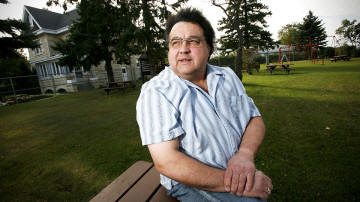

Probe finds ‘reasonable basis' to believe Frank Ostrowski, who has spent 23 years behind bars, was framed in 1986 murder case
Kirk Makin
Wednesday, Sep. 30, 2009
Globe and Mail
From Thursday's Globe and Mail Last updated on Wednesday, Sep. 30, 2009 08:31PM EDT
After spending 23 years behind bars, Frank Ostrowski, a cocaine dealer convicted in the murder, sought bail Wednesday upon learning that a federal investigation found there is a “reasonable basis” to believe he was framed in the murder of Robert Nieman.
The finding came in response to grave allegations that police and prosecutors concealed the fact that a witness who perjured himself at Mr. Ostrowski's 1987 trial was given a deal in return for his testimony.
“When you're innocent, you don't give up,” Mr. Ostrowski said Wednesday in an exclusive interview with The Globe and Mail.
“I've been fighting ever since they arrested me. You just have to keep kicking and kicking and kicking at that door. Finally, the door falls in.”
Mr. Nieman, 23, was ambushed in his apartment on Sept. 24, 1986, and shot three times in the face. The Crown portrayed Ms. Ostrowski at his trial as a drug lord who arranged Mr. Nieman's murder in the belief that he had told police where to find cocaine and cash in Mr. Ostrowski's home.
In pivotal evidence for the Crown, Mr. Ostrowski's partner in his drug operation – Matthew Lovelace – testified that he called police on the night of the killing to warn them that Mr. Ostrowski had openly discussed eliminating Mr. Nieman.
Painting himself as a good Samaritan, Mr. Lovelace told the jury: “I did not ask for a deal and I was not promised one.”
However, in a scathing, 229-page brief sent to the Department of Justice by the Association in Defence of the Wrongly Convicted, lawyers James Lockyer and Alan Libman said this was a blatant lie countenanced by police and the Crown.
They said that, in direct contradiction to Mr. Lovelace's assertion, outstanding cocaine trafficking charges against him were later withdrawn during a cryptic, 45-second court proceeding.
The AIDWYC brief specifically cited a 1986 Crown memo, in which a prosecutor outlined how Mr. Lovelace's cocaine charges would be withdrawn, if he “comes thru with the goodies.”
The AIDWYC brief alleged: “There can only have been one reason to keep the deal off paper, and that was to maintain deniability at the forthcoming homicide trial that any deal had been made,” it said. “In achieving this end, the integrity of a first-degree murder trial was sabotaged.”
The brief accused several officials of being party to the alleged conspiracy – including a senior Manitoba prosecutor, George Dangerfield.
“A secret arrangement – which met with Mr. Dangerfield's approval and the approval of higher-ups in Manitoba Justice – was negotiated by the Winnipeg Police Department with the Federal Department of Justice prosecutor and Lovelace's counsel, Hymie Weinstein,” the brief said.
“It seems that Lovelace believed he could lie under oath with impunity and without fear of consequences. The whole episode is unworthy of our criminal justice system.”
The brief also said that a recent statement Mr. Dangerfield made to the effect that he knew nothing about the deal was “devoid of credibility.”
The accusations add another layer to a dark cloud surrounding Mr. Dangerfield. Two men he helped convict of murder – James Driskell and Thomas Sophonow – have been exonerated in recent years. A third – Kyle Unger – is well on the way to establishing that he was wrongly convicted.
Three other men were co-accused in the Nieman murder: Robert Dunkley, Jose Correia and James Luzney. Mr. Dunkley and Mr. Correia were eventually convicted, but Mr. Luzney was acquitted after Mr. Dunkley refused to testify against him.
Mr. Ostrowski said Wednesday that Mr. Lovelace – not Mr. Nieman – was the only person who knew where his cash and cocaine stash was located. “He took a deal to get off on his own charges,” he said.
Mr. Ostrowski added that he hopes to see police and prosecutors in his case pay a stiff price: “I'd like to see them follow their own guidelines and their own laws and be held accountable for their actions.”